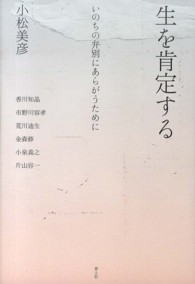- ホーム
- > 洋書
- > 英文書
- > Business / Economics
Full Description
Departing from the category of 'peripheral socialism', this book offers an economic history of the Cuban revolution between 1959 and 2019, with a focus on the period that ranges between 2008 and 2018.
The core of the research is the administration of Raúl Castro and the economic and social reforms introduced by it under the concept of socialism update. The book describes Cuba's recent economic policies and analyses the structure and dynamics of Cuba's economic changes, offering a panoramic view which can serve as an introduction to further more detailed analyses. The book also offers an interpretation of Cuba's socialism in light of the Latin American political economy of underdevelopment, so as to interpret Cuba's structural economic performance.
The analytical background will enable readers to understand the contemporary crises in Cuba, with a balanced look at the triumphs and limits of its peripheral socialism. It will find an audience among scholars and researchers of economic development and history, macroeconomics, Latin American and Cuban Studies, Socialism Studies, and related areas. It will also be of interest to economists, politicians, diplomats, journalists, and NGOs.
Contents
1. Introduction: Cuban Revolution and Peripheral Socialism Part 1. Economic History 2. The economic history of the Cuban Revolution: an overview, 1959-1999 3. Cuba in the 21st Century: reforming the peripheral socialism (2000-2010) 4. Socialist update: The Guidelines of Economic and Social Policy of the Party and the Revolution and its consequences (2011-2018) Part 2. Macroeconomic and Structural Analysis 5. Macroeconomic performance 6. Balance of payments 7. State sector and social aspects 8. Final remarks: crisis or peripheral?








